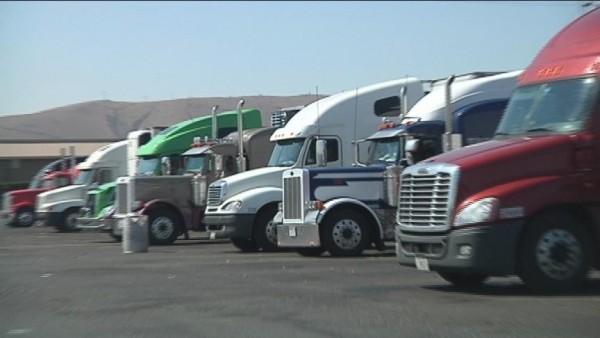Quick Transportation’s 20,000 specialists pull products in very nearly 14,000 major apparatus trucks that venture to every part of the interstates and country byways of the United States consistently. The organization’s execution is nearly fixed to the country’s economy, which has been looking progressively sunny of late.
So it was astonishing a month ago when Swift’s stock plunged almost 18 percent in a solitary day. The tumble wanted an odd reason. It wasn’t on account of there was excessively little business — yet, rather, excessively.
“We were obliged by the testing driver advertise,” the organization said in its quarterly income report. “Our driver turnover and unseated truck number were higher than foreseen.”

At the end of the day, Swift had a lot of clients needing to ship merchandise. Yet in a period of lifted unemployment, it some way or another couldn’t discover enough drivers. How is that conceivable? The purposes behind that conundrum let us know an extraordinary arrangement about what has been sickly U.s. laborers and why a full monetary recuperation has been so abate in nearing.
Consider this: The American Trucking Associations has assessed that there was a lack of 30,000 qualified drivers recently, a number on track to climb to 200,000 throughout the one decade from now. Trucking organizations are turning down business for need of laborers.
Yet the thought that there is a tremendous deficiency of truck drivers goes against a jobless rate of more than 6 percent, also Economics 101. The most fundamental of financial speculations would propose that when supply isn’t sufficient to take care of demand, this is on account of the cost — for this situation, truckers’ wages — is excessively low. Raise compensation, and a plentiful supply of specialists ought to take after.
However corporate America has ended up so stingy about paying specialists outside the official suite that serious compensation builds may appear an inadmissible abuse. In nature’s turf, it might be simpler to say “There is a deficiency of gifted specialists” than “We aren’t paying our laborers enough,” regardless of the possibility that, in monetary terms, those descend to the same thing.
Running the numbers
The numbers are uncovering: Even as trucking organizations and their exchange affiliation wail over the driver lack, truckers — or as the Bureau of Labor Statistics calls them, substantial and tractor-trailer truck drivers — were paid 6 percent less, generally, in 2013 than 10 years prior, balanced for swelling. It takes an unconventional type of rationale to cut pay consistently and after that be stunned that less individuals need to do the employment.
A large number of capable Americans need work, yet there aren’t sufficient center wage employments for them. That is particularly the case for men without cutting edge instructions, who have seen their wages discouraged over the recent decades. Trucking would appear to be a magnificent alternative.
It’s not a perfect employment for everybody. There is no doubt that trucking is diligent work, requiring extended periods and more extends far from gang. At the same time that is the reason it is generally adjusted, at any rate in examination to different occupations not obliging advanced educations. The normal pay for a whole deal trucker is scarcely short of $50,000, as indicated by the ATA, and an accomplished trucker with a decent security record can make altogether more than that.
The work ordinarily offers rich profits that are progressively uncommon for nonunion hands on representatives.
The employment could be adapted decently fast. In a few commercial ventures, organizations grumble of deficiencies of laborers for occupations that oblige years of cutting edge preparing, in the same way as certain building strengths. Trucking is not one of those businesses, then again.
An individual can get a business driver’s permit after a course that might be as concise as six weeks of serious study. Also, there were really less truckers working a year ago (1.585 million) than five years prior (1.673 million). A portion of the missing specialists could apparently be urged go into the business if the cash were correct.
Complexities
Undoubtedly, the trucker-lack picture is more intricate than this, notes Bob Costello, the ATA’s boss economist. He says these intricacies make a direct story of truckers basically being come up short on not exactly reasonable.
For instance, new security necessities imply that individual truckers drive less miles than 10 years back: A normal whole deal truck can now blanket 8,000 miles a month, down from just about 11,000 in 2007, as indicated by the exchange affiliation.
This helps represent descending compensation weight. Furthermore the trucking organizations themselves are regularly dealing with dainty overall revenues and serving clients on long haul contracts, which implies that on the off chance that they basically raised pay pointedly to select more truckers, they could wind up losing cash.
Yet there are a few signs that this state of issues may not last: The lack of truckers is one bit of proof that the equalization of force is moving. In late profit calls, administrators from organizations as changed as Jetblue and Plano-based Dr Pepper Snapple Group have communicated stress over climbing pay weights.
The trucker lack is now bringing about higher wages in parts of that industry. There have been $2,000 marking rewards from organizations looking to poach truckers and, as Kevin Knight of Knight Transportation specified in that trucking organization’s most recent profit call, for every mile boosts in salary have been working out to 5 to 10 percent hops in driver pay.
Administrators may moan about higher pay for specialists in light of the fact that it could cut net revenues. At the same time after an era in which the average U.s. family has seen level to declining expansion balanced wage, pay builds are a welcome restorative. At the point when specialists start to have more power in compensation arrangements, it is an indication of an enhancing economy, not an obligation that businesses should be complaining about.
